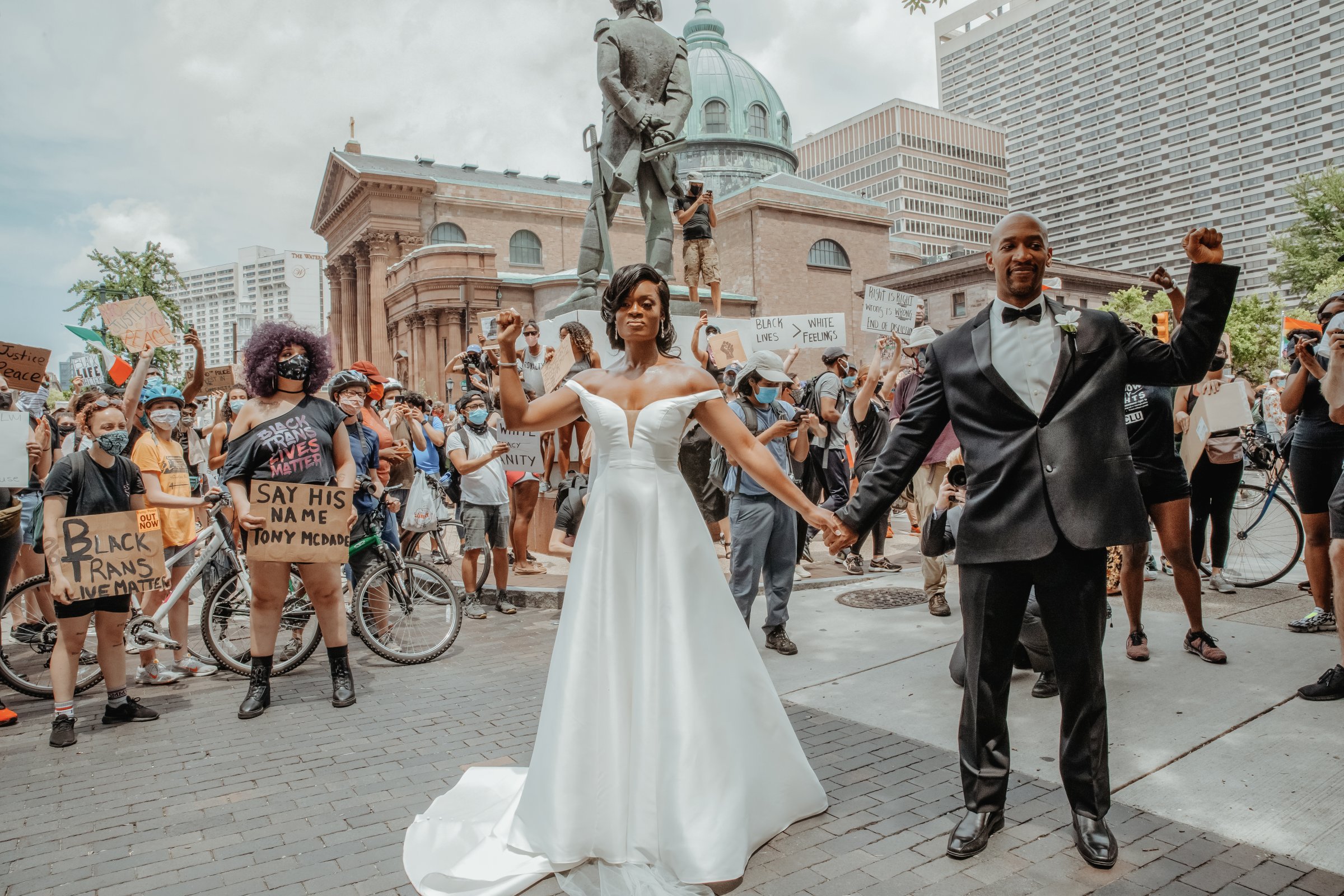
On Saturday, June 6, Dr. Kerry Anne Perkins was making the short walk from the downtown Philadelphia Sheraton where she had stayed the night before to the courtyard of the nearby Logan hotel to get ready to see her husband-to-be Michael Gordon as a groom for the first time when she realized that she had left her bridal bouquet in her room. It was that unplanned delay that allowed the Black Lives Matter march taking place in the city that day to catch up with her. It even led to her and Gordon joining in the protest ahead of their wedding ceremony. Since that day, photos and videos of the time the couple spent with the protestors have spread around the world, with one video of them sharing a kiss in the midst of the crowd garnering nearly 40,000 likes on Twitter.
Perkins and Gordon aren’t the only couple who have put their love on display at recent marches. As global protests over racism and police brutality in the U.S. continue, a number of couples participating in them — or in Perkins and Gordon’s case, getting married alongside one — are taking a moment to celebrate the love they have for each other amid the broader movement for equality and justice.
In Philadelphia, San Francisco and Raleigh, weddings and proposals coinciding with Black Lives Matter protests have been a setting for a display of joy for a handful of couples in the midst of one of the most painful and momentous episodes in recent U.S. history. In the wake of the death of Ahmaud Arbery in Georgia in February, the fatal police shooting of Breonna Taylor in Louisville in March and the killing of George Floyd by a Minneapolis Police officer in May, demonstrators in all 50 states — as well as a number of countries around the world — have turned out in droves to protest violence against Black people. In turn, these demonstrations have sparked a long overdue reckoning with systemic racism in America.
The three couples who TIME spoke to have experienced varied reactions to their relationship milestones taking place within the context of Black Lives Matter protests. But all of them have been mindful about not wanting to detract from the purpose of the larger movement. Instead, they say they hope their gestures of love underscore the power and importance of this pivotal moment in time.
Here are the stories of three couples in places across the country who have marked major moments against the backdrop of recent Black Lives Matter protests.
Dr. Kerry Anne Perkins and Michael Gordon
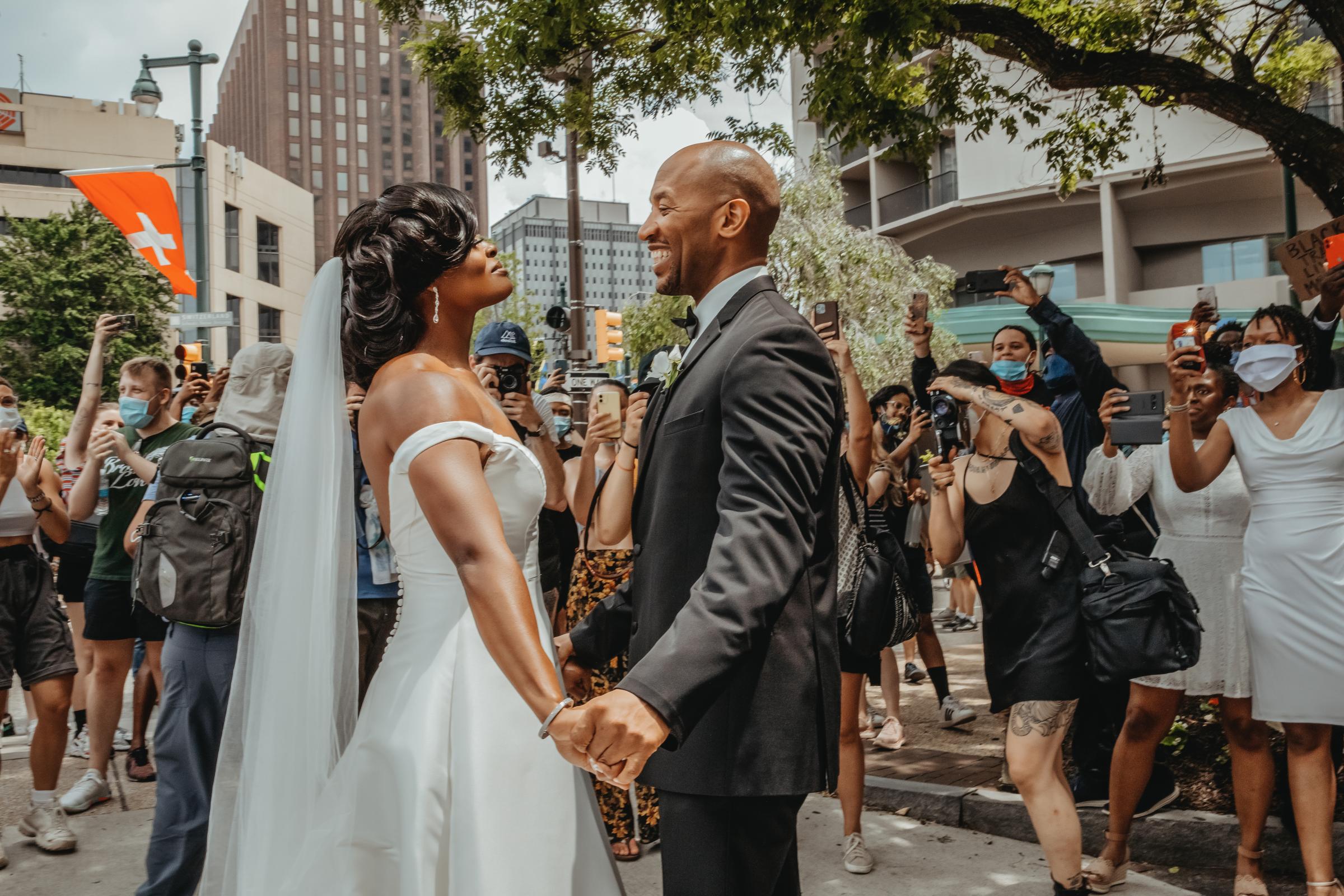
While waiting on her forgotten bouquet, Perkins says that one of the protests taking place in Philadelphia that day, reportedly the largest Black Lives Matter demonstration in the city yet, began moving down the parkway adjacent to the Logan hotel. “As it was passing through, people started to notice me there,” she says. “At that point, I had my veil on, I had my shoes on and everything. I was just missing my bouquet. And so people started to cheer and they were really just sending me love.”
But it wasn’t until she moved closer to the street to get out of the sun, Perkins says, that protestors began gathering around her. “The area that had shade was closer to the street where the protesters were, so I moved there and I see people really slowing down with the march,” she says. “As some of our family members started to come around the corner to see what was happening, the cheers continued and built up and people started to surround me. I’m not even sure exactly why that happened, but I think everyone was just so excited by the fact that there was a bride there that they came to a standstill.”
That’s when Gordon, who was standing in the Logan courtyard eagerly waiting to catch sight of his bride, heard applause from around the corner. “I start hearing cheering and clapping and congratulating and there was just a ruckus and a roar from around the corner. But I can’t see it. I can only hear it,” he says. “So a few of my family members start to trickle off to go up there and look, people start clapping and I see cell phones going up in the air.”
Since their ceremony was supposed to take place in the courtyard, Gordon says that family members originally tried to stop him from investigating what was happening. But after seeing the scene at hand for themselves, they urged him on instead. “At that point, I run over, run up the steps, run around the corner and I’m just looking for Kerry,” he says. “I’m going toward the focal point of the applause and as I’m running, people see me coming and they’re like, ‘Oh, well this must be the guy.’ They start parting to let me through and Kerry Anne is standing there looking like a beautiful Black princess with her dress on amongst all the protesters around her clapping and congratulating and saying things like, ‘You guys are beautiful,’ ‘Black love,’ ‘Black lives matter.’ Any positive statement you can think of, that’s all we heard. All I remember is positivity and love.”
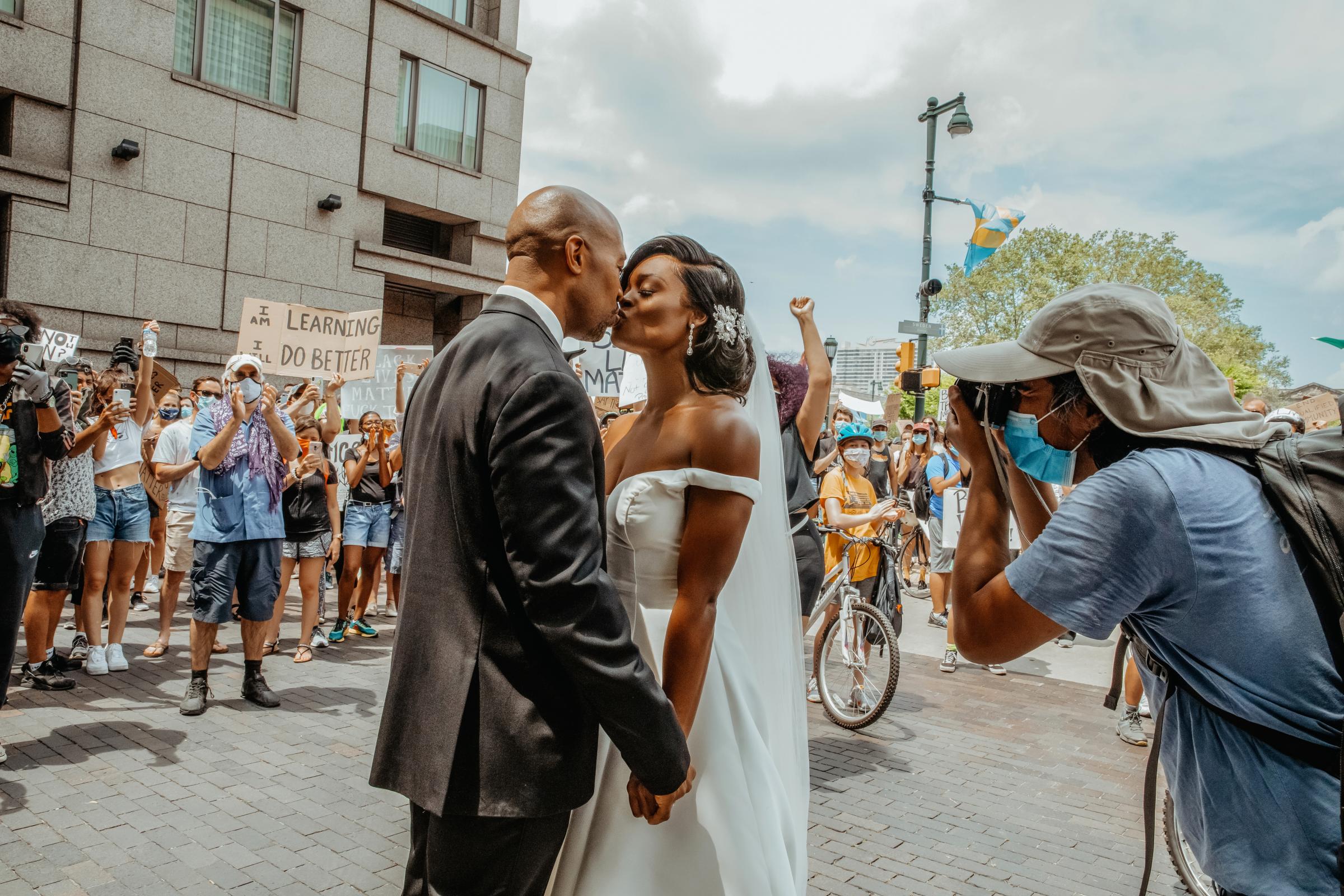
As Perkins saw Gordon approaching, she says that she couldn’t help but think about how it seemed like their relationship was always meant to lead them to that moment. “I was thinking about all of our most important moments in time together. I was thinking about the vows that I wrote five months ago that talked about how he’s an amazing Black man and how that’s such an important and pivotal thought that manifested five months before but was still relevant to that minute,” she says. “I was also reflecting on the movement that started just days prior to that and what that movement is all about. That moment in time and all those thoughts in my mind were overwhelming my spirit and soul and it got to the point where my emotions were just overflowing.”
The forgotten bouquet, however, wasn’t the first hiccup in Perkins and Gordon’s wedding plans that led to this moment of what they say seemed like kismet. After getting engaged in January 2019, the couple had originally planned to wed in a large ceremony at the Legacy Castle in Pequannock, N.J., on May 26, 2020. But as has been the case for many couples in recent months, the coronavirus pandemic necessitated a change in plans. They decided to go ahead with a much smaller ceremony at the Logan on June 6, keep their marriage a secret and reschedule their original wedding for spring 2021. At the time, they had no idea that the date for their “micro-wedding” would come just over a week after protests sprung up around the country in the wake of George Floyd’s death.
Based on their viral popularity, the photos and videos of Perkins and Gordon’s interaction with the protest clearly struck a chord with people. “I think it was a moment for everybody where it was like, what we are chanting and protesting about and what we are hoping and longing for is right before our eyes,” the couple’s officiant, Rev. Roxanne Birchfield, says. “It was a symbol of hope, a symbol of peace, a symbol of not just Black lives mattering, but something that’s connected to Black lives mattering, the Black family.”
For her part, Perkins says that she thinks the resonance of the moment has much less to do with who she and Gordon are as people than what their union represents in the midst of this historic movement.
“People around the world aren’t looking at us because they know us, but because they see something in us that we were exuding at that time that’s needed in society. I think that’s what this really comes down to,” she says. “What people knew was that there was going to be a union and that union must have been built on love. I think people really needed to feel that. Because when I look back on it, believe it or not that’s what I see. When I see those images, I don’t see Mike and Kerry. I see love and unity. We’re so appreciative to everyone around the world for recognizing that, for uplifting us with that and encouraging others to be uplifted as well.
Marjorie Alston and Xavier Young
When Xavier Young saw how passionate his girlfriend, Marjorie Alston, was about going out to protest in support of the Black Lives Matter movement, that’s when he says he knew he wanted to propose at the May 30 march they were planning to attend in Raleigh, N.C.
“I had the idea beforehand that I wanted to propose because once she convinced me to go and I was able to get off work, I was like, ‘She’s really passionate and she’s down to do this,'” he says. “So I went ahead and threw the ring in my book bag just to make sure I had it in case the opportunity presented itself.”
But Young says the moment that he actually got down on one knee was spontaneous. “I didn’t necessarily know that I was going to do it right there or at that moment in that spot,” he says. “It just seemed like a good time.”
While Alston says that she knew Young was going to propose eventually, she never expected it to be at the protest. “I just really wanted to go because I felt like the more voices being heard on these serious issues the better. I thought a lot of people needed to be there for it,” she says. “I didn’t know [he was going to propose] that day or at the protest, so I was just excited when I saw he was down on one knee. I’d been waiting for that day for a while.”
After meeting while working at Hard Knocks laser tag in Raleigh in 2018, Young and Alston dated for nearly two years before Young popped the question. “That summer when we started dating neither of us was looking for a relationship,” he says. “It just so happened that we met each other and started dating and fell in love and here we are now.”
Now, the couple has a baby on the way and are planning their wedding for September 2021. In addition to trying to make sure Alston was safe, Young says that a major reason he wanted to be at the protest was to do his part to fight for a better world for their future child. “Not only does what we’re protesting for affect me, but I’m also about to have a baby,” he says. “I want to make sure things are actually changing.”
Despite the fact that Young and Alston say they never expected their story to get as big as it has amid everything going on, they ultimately feel it’s good for people to see the love they have for one another right now. “I think you’ll see them in a textbook one day as a part of history,” Young says of the viral photos of them celebrating their engagement. “For us to be able to display that love and commitment for one another in the midst of that protest and what’s going on, I think that’s pretty amazing. People are marching and the Black community is hurting and we’re in pain and we’re outraged and we want change, but it’s definitely good for our community to see people who look like them and who they can identify with loving each other.”
Carrie Montgomery and Quin Messenger
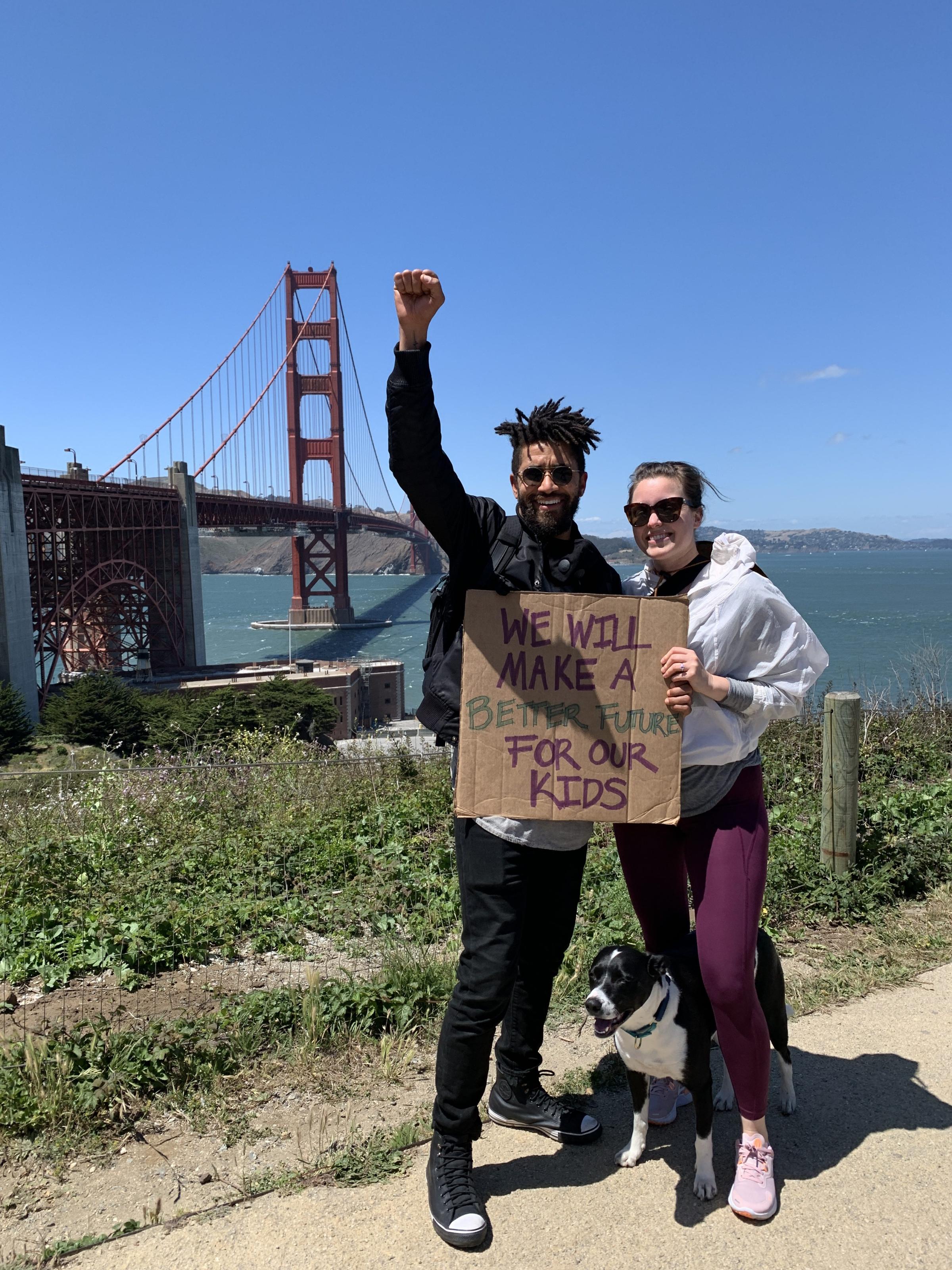
Ahead of the June 6 protest in San Francisco where he proposed to his then-girlfriend, Carrie Montgomery, Quin Messenger wasn’t sure if he wanted to attend a march. Although he identifies as multiracial — with Black, Indigenous and white ancestry — Messenger says that because he is generally perceived as a Black man, it’s given him a fear of going to protests. “I wanted to go but I just didn’t feel safe doing so,” he says. “It was this really difficult moment of navigating what I felt was my own responsibility, but also feeling like my right to go had almost been taken away from me because I was so afraid. That was really hard for me to process.”
But after Montgomery decided to go to a protest earlier that week, he says that a period of reflection helped him arrive at the conclusion that it was his responsibility to be as active a participant as possible in the fight for change. “I could feel this sort of cultural trauma stirring up inside me,” he says. “I could feel that pain and it stirred up all these latent fears in me with respect to police brutality and identifying as a person of color and being seen that way. And in that moment, I really realized that with mine and Carrie’s union, with bringing together these cultural legacies that are very much in the public eye right now, if I was going to be an example for our future children, then I had to go. I had to be able to move past that fear and be an example not just for our children, but also for people in our general circles.”
The couple’s five-year relationship was one of the things keeping Messenger grounded as he and Montgomery marched across the Golden Gate Bridge alongside thousands of other demonstrators that Saturday, he says. “I had the [engagement] ring and I had our love and that’s what I really looked to to help lead me,” he says. “The ring was a physical manifestation of our love that I needed in what was, for me, a very transformative moment of getting more in touch with my own fears and my own Blackness.”
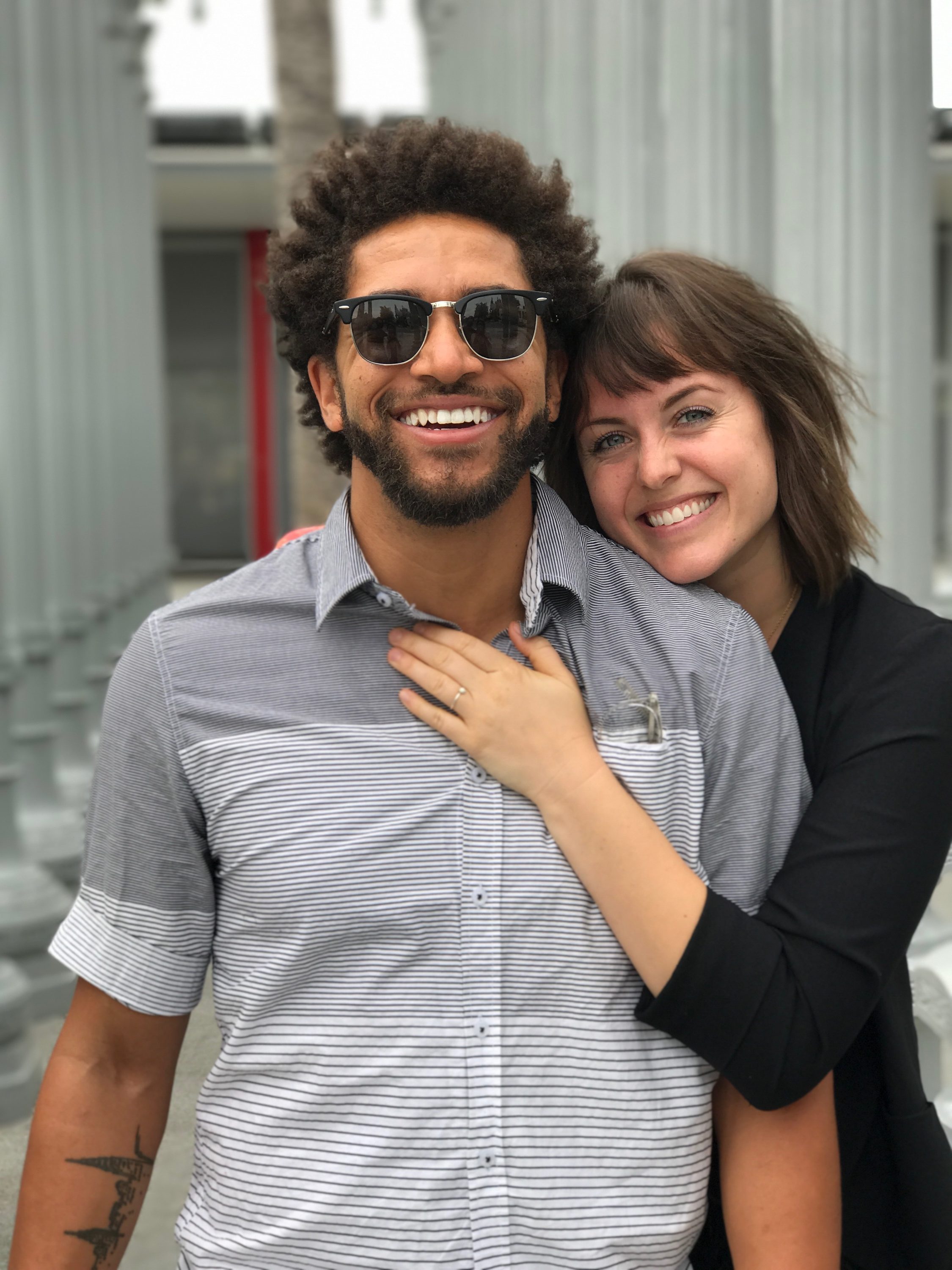
Messenger, who met Montgomery in Birmingham, Ala., while on assignment for a Los Angeles design firm at the Birmingham Museum of Art, says that it makes sense for them to have gotten engaged at a protest as their relationship has always been rooted in working towards understanding their own roles in the fight for racial justice. “With Birmingham being a touchstone for the civil rights movement, it really gave me an opportunity to reflect more on myself and my own past history,” he says, noting that he has family ties in Clarksdale, Miss. “Pretty much every time I visited Birmingham, we made an effort to go see some sort of civil rights landmark. So it’s kind of no surprise that [our relationship] came full circle for [our engagement] to happen at this moment in the sense that it was rooted there.”
The time they spent together in the south, Montgomery adds, helped them learn more about each other as well as their own family histories and legacies. “He was based in LA at the time, and I was based in Birmingham, so we used the lens of art and exploration and social practice to better understand each other’s pasts,” she says. “I think that’s really been something that’s helped us not only understand each other as people but also, with an empathetic eye, be able to further understand other movements and other experiences.”
But even after five years together, Montgomery says that when Messenger first got down on one knee in the midst of the protest, she had no idea what was happening. “Everyone around me definitely knew exactly what was going on a solid 15-20 seconds before I did and they were taking out their phones and cheering and putting their fists up in the air,” she says. “I think a lot of my shock was just from hundreds of people surrounding us and yelling and looking at us and holding up their signs. And then when I realized what was going on after I saw the ring, it kind of switched me from the mindset of the protest to a very personal and intimate and deeply moving moment.”
Despite the overwhelmingly positive reception that their engagement garnered in real time, in the aftermath of the moment going viral, the couple says they have faced some criticism. “We were very sensitive to our story of joy and love and light being something that wasn’t going to detract from the greater movement,” Messenger says. “And I think what I’ve also been unpacking is that while there are some people who have their own opinions about whether or not it was the right time or space [for me to propose], it’s definitely brought to light that there are conversations around interracial relationships that need to happen within the Black community and need to happen within the white community.”
The attention they’ve been receiving, both positive and negative, has only made them even firmer believers in using their platform to try to have meaningful discussions, Montgomery says. “At no point have we tried to say that being an interracial couple fixes racism or that our union is the solution to curing a built-in system of oppression in this country,” she says. “We’ve really just tried to honor the truth that we can speak to in our own individual experiences and honor our own responsibility and accountability and continue conversations on racism the best we can.”
For Messenger, this experience has also stressed the importance of getting comfortable with being uncomfortable. “I think that’s something that everyone needs to be doing right now whether you’re in the white community or the Black community. It doesn’t matter. We all need to get comfortable with being uncomfortable and that comes from really looking into our pasts and looking into ourselves,” he says. “In order to take action and inspire change in the present, we must first understand our past and move forward from there with empathy and love. This is work that we all have to do every single day.”
More Must-Reads from TIME
- How Donald Trump Won
- The Best Inventions of 2024
- Why Sleep Is the Key to Living Longer
- Robert Zemeckis Just Wants to Move You
- How to Break 8 Toxic Communication Habits
- Nicola Coughlan Bet on Herself—And Won
- Why Vinegar Is So Good for You
- Meet TIME's Newest Class of Next Generation Leaders
Write to Megan McCluskey at megan.mccluskey@time.com